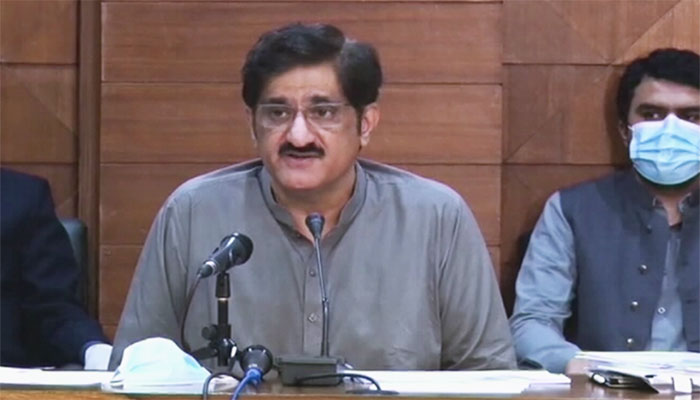CM Murad Ali Shah answerable to Sindh’s 60m people, not to Bilawal, says Haleem Adil Sheikh
Commenting on Chief Minister Syed Murad Ali Shah’s statement that “he is not answerable to the prime minister, Sindh Assembly opposition leader Haleem Adil Sheikh said on Wednesday the chief minister “is answerable to six crore people of Sindh because it is democracy and this is not a fiefdom or kingdom” of the Pakistan Peoples Party’s supremo.
After taking charge of the opposition leader in the provincial assembly, PTI central vice-president Sheikh addressed a press conference, where he criticised the PPP for its “bad governance and corruption” during its rule in the province over the past 13 years.
PTI Karachi president and MPA Khurram Sherzaman, parliamentary leader Bilal Ghaffar and other leaders accompanied him at the press conference held at the Sindh Assembly. He said the public accounts committee should be given to the leader of the opposition, but in the Sindh Assembly, no opposition member was included in this committee. “The PPP’s standards change when they are in the National Assembly,” he said.
He cited the examples of several committees of the National Assembly and the Senate, of which PPP leaders, including Chairman Bilawal Bhutto, Asif Ali Zardari, Syed Naveed Qamar, Sajid Hussain Turi, Farooq Naik, Rubina Khalid and Sassui Palijo, were made leaders.
“But in the Sindh Assembly, the PPP is reluctant to give chairmanship of these committees to Firdous Shamim Naqvi, Khuram Sherzaman, Hasnain Mirza and Nusrat Sehar Abbasi -- the parliamentarians from the opposition.”
“It shows there is a civilian dictatorship in Sindh,” Sheikh said. He asked to dissolve all such committees for which opposition members were not considered. Sheikh said that the opposition and media had to play a key role in highlighting the problems of people. “Nowhere do courts normally annul laws passed by the assemblies, but the Sindh Assembly made three laws and the Supreme Court of Pakistan annulled them,” he said.
Showing his concerns over the non-implementation of the passed bills, he said that law for the use of auto-lock syringes was passed but not implemented. “Similarly, a law of compulsory education was passed, but six million children are not getting education,” the PTI leader said.
Sherzaman said Karachi’s residents were not being provided the basic necessities of life. “Public transport in Karachi is dismally poor and the local government department is being utilised for political purposes of the ruling party,” he said.
PTI parliamentary leader Ghaffar said the Sindh’s economy became stronger in 2020, the IT sector prospered a lot and the FBR had completed its targets mainly because of the federal government’s policies. He said 32 per cent of the federal government’s budget was spent on development.
-
 Prince William On Verge Of Breakdown Because Of 'disgraced' Andrew
Prince William On Verge Of Breakdown Because Of 'disgraced' Andrew -
 Tig Notaro Reflects On Oscar Nod For 'Come See Me In The Good Light': 'I Was Sleeping'
Tig Notaro Reflects On Oscar Nod For 'Come See Me In The Good Light': 'I Was Sleeping' -
 Kenyon Sadiq Sets 40-yard Dash Record At NFL Scouting Combine, Eyes First Round
Kenyon Sadiq Sets 40-yard Dash Record At NFL Scouting Combine, Eyes First Round -
 Talk Show Host Drops Hint About Taylor Swift, Travis Kelce Wedding Date
Talk Show Host Drops Hint About Taylor Swift, Travis Kelce Wedding Date -
 Andrew Scandal Brings New Worries For Prince Harry, Meghan Markle
Andrew Scandal Brings New Worries For Prince Harry, Meghan Markle -
 King Charles Imposes New Restrictions On Ex-Prince Andrew In Surprise Move
King Charles Imposes New Restrictions On Ex-Prince Andrew In Surprise Move -
 Chris Hemsworth Reveals How Elsa Pataky Guides His Career Moves
Chris Hemsworth Reveals How Elsa Pataky Guides His Career Moves -
 Was Travis Barker In A Relationship With Kim Kardashian Before Marrying Her Sister?
Was Travis Barker In A Relationship With Kim Kardashian Before Marrying Her Sister? -
 Brad Pitt Feeling Down In The Dumps After Kids' Snubs As Pals Continue To Paint Angelina Jolie A Villain
Brad Pitt Feeling Down In The Dumps After Kids' Snubs As Pals Continue To Paint Angelina Jolie A Villain -
 Ex-PM Speaks Out On Andrew Mountbatten-Windsor In Newspaper Column
Ex-PM Speaks Out On Andrew Mountbatten-Windsor In Newspaper Column -
 Eric Dane Remembered In Glowing Tribute By Trans Activist In 'Grey's Anatomy'
Eric Dane Remembered In Glowing Tribute By Trans Activist In 'Grey's Anatomy' -
 Zach Braff, Sarah Chalke Explain J.D. And Elliot Twist In 'Scrubs' Revival
Zach Braff, Sarah Chalke Explain J.D. And Elliot Twist In 'Scrubs' Revival -
 Jim Carrey's Death To Body Double: Comedian's Latest Appearance Sparks Conspiracy Theories
Jim Carrey's Death To Body Double: Comedian's Latest Appearance Sparks Conspiracy Theories -
 Aespa's Ningning Steals Spotlight With Hilarious Viral Video From Milan Fashion Week
Aespa's Ningning Steals Spotlight With Hilarious Viral Video From Milan Fashion Week -
 Should Benedict Be Forgiven For Mistress Question? 'Bridgerton' Star Yerin Ha Reveals
Should Benedict Be Forgiven For Mistress Question? 'Bridgerton' Star Yerin Ha Reveals -
 John F. Kennedy Jr. Wife Carolyn Bessette's Last Minute Bridal Crisis Revealed
John F. Kennedy Jr. Wife Carolyn Bessette's Last Minute Bridal Crisis Revealed




